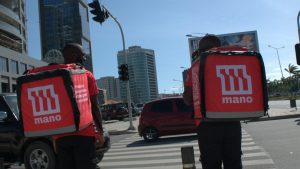
Mano, a grocery delivery startup known for its focus on high-end areas in Lagos and Abuja, is venturing into Nigeria’s crowded food delivery market. Founded in 2020, the Angolan company has carved out a niche with its dark stores (fulfillment centers without physical stores) and 40-minute delivery windows within a 10km radius.
This expansion marks a bold move for Mano, considering the fierce competition in the $936.5 million segment dominated by players like Chowdeck, Food Court, Glovo, and HeyFood. Notably, Bolt and Jumia exited the space in late 2023.
A Different Approach to Food Delivery
While existing players burn through cash on marketing and face pressure to slash commissions, Mano is taking a unique approach. The company will implement a flat delivery fee of ₦1,400, higher than competitors, but likely acceptable to their target clientele in affluent areas who are already accustomed to similar fees for grocery deliveries.
Mano acknowledges customer pain points like delayed deliveries, damaged food, and cumbersome refunds. To address these issues, they’ll shift from their current inventory model (used for groceries) to an aggregation model akin to Chowdeck and Glovo. This allows for a wider restaurant selection but comes at the cost of less control over food quality and preparation time.
Focusing on Efficiency and Customer Experience
To mitigate quality concerns, Mano will leverage real-time order tracking, a feature offered by many competitors. Additionally, they’ll maintain their 10km delivery radius from partnered restaurants, ensuring faster delivery times. Unlike some startups aiming for rapid expansion, Mano prioritizes efficiency over breakneck growth.
Industry experts see this as a deliberate strategy. “Mano seems to be building a model focused on efficiency, not just scale,” said a former food delivery executive. Mano’s marketing manager, Fadekemi Adefemi, emphasizes, “[We’re] not looking to serve everybody… We want to nurture them and ensure they have all they need.”
Data-Driven Growth and Strategic Expansion
Despite the “tactical approach,” Mano harbors ambition. Adefemi clarifies, “We are revenue-focused, but we are a very data-driven team.” Their projections reportedly indicate steady revenue growth with a focus on consistent quality deliveries. While Mano declined to share user numbers or gross merchandise value for their grocery delivery arm, they did reveal that investors (who have contributed over $4 million) believe the food delivery expansion is a timely decision.
Mano’s entry into the food delivery market injects a fresh perspective. Their focus on quality control, efficiency, and customer experience could be a winning formula in a market saturated with aggressive competition. Whether they can carve out a sustainable niche in this crowded space remains to be seen, but Mano’s data-driven approach and focus on customer satisfaction are intriguing factors to watch.
